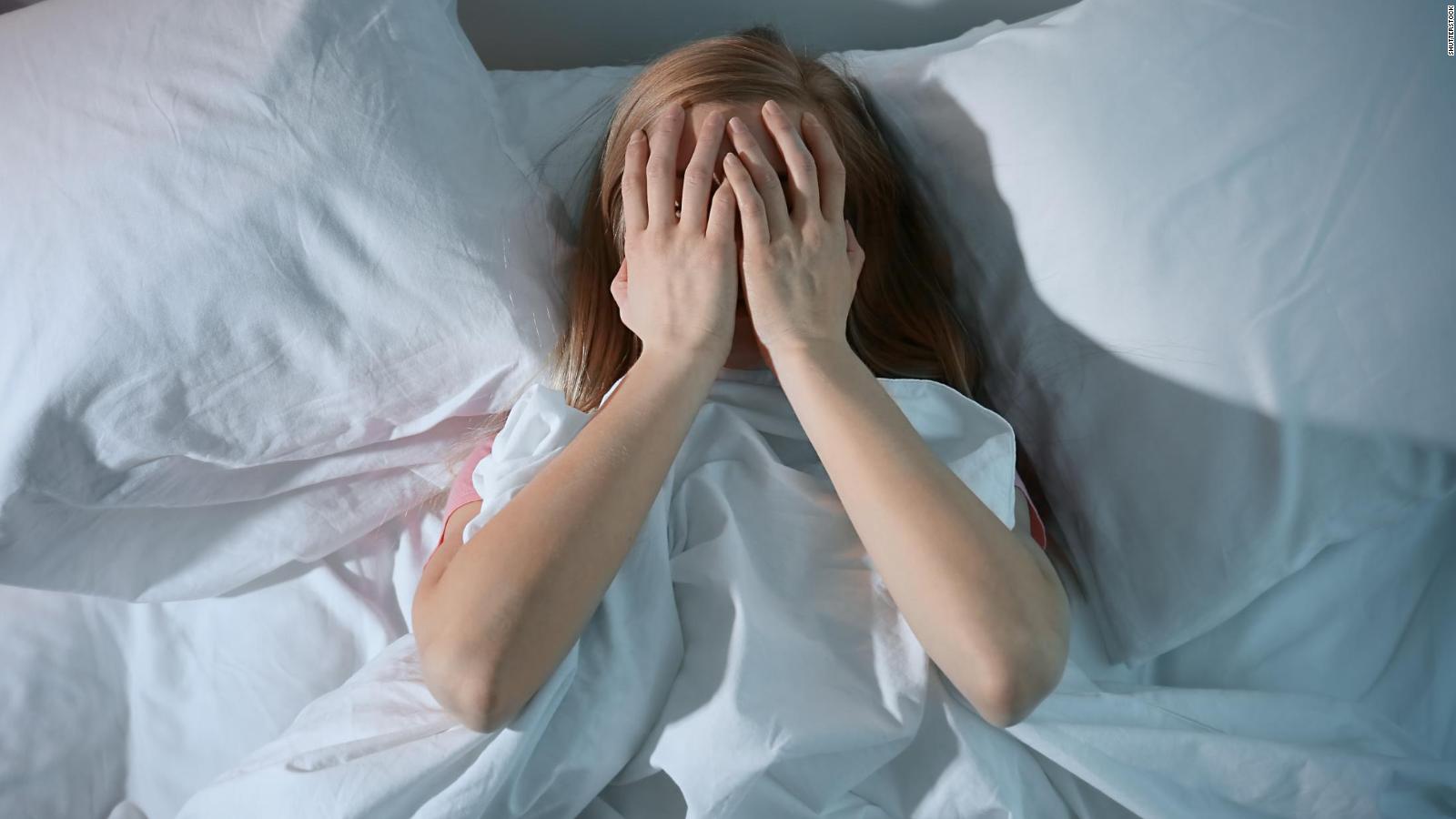Why is it important to get enough good sleep?
3:23
(CNN) -
Sleeping during the covid-19 pandemic has become a nightmare for Aparna Aswani.
Between easing off the stresses of your workday and managing your anxiety after reading about the pandemic and politics, you're in luck if you manage to get to bed before midnight.
Once this 44-year-old marketing executive falls asleep, she usually wakes up two or three times before the alarm goes off around 6 a.m.
When she has a good night, Aswani sleeps four or five hours before waking up and beginning her duties as a mother and virtual learning facilitator for her 5-year-old son.
On bad nights, Aswani hardly sleeps.
"I have never slept well, but it has been 20 times worse since the pandemic started," Aswani said.
"It's gotten to the point where just thinking about sleeping stresses me out."
You are not crazy.
It really is a difficult time in life.
And there are several ways to deal with anxiety and uncertainty.
Alcoholic effect: How much beer is sleeping badly?
1:03
Aswani, who lives in San Clemente, California, is one of many people who have experienced some kind of disruption in their usual sleep routines since the pandemic began in March.
For some, the changes are subtle: more restlessness or a worse quality of sleep.
For others, the new reality is hell: a chronic lack of sufficient sleep or total insomnia.
advertising
Some experts have come to dub the current trend "coronasomnia," said Christina Pierpaoli Parker, a postdoctoral fellow in clinical psychology and behavioral sleep medicine at the University of Alabama at Birmingham.
Whatever we call it, Pierpaoli Parker said there are strong links between the pandemic and insomnia.
"Good sleep is the foundation of all aspects of mental and physical health, which we must support now more than ever," he said.
"When we create the optimal cognitive, behavioral and environmental conditions for sleep, including low ambient temperatures, we also support the optimal conditions for overall health."
Sleep problems during the pandemic
We cannot simply blame the pandemic.
Insomnia was a problem long before this latest crisis.
About a third of adults in the United States slept the minimum seven hours per night recommended by the American Academy of Sleep Medicine, according to 2016 data from the US Centers for Disease Control and Prevention (CDC). .
Since the pandemic began, the numbers have worsened.
While there has been an overall 11.3% decrease in the number of prescriptions filled for sleep disorders since 2015, the number of prescriptions filled for sleep disorders between February 16 and March 15 increased by 14.8 %, according to a report from Pharmaceutical Benefits Manager Express Scripts.
More recently, 36% of Americans reported having difficulty sleeping this summer due to stress from the pandemic, according to a study by the Kaiser Family Foundation.
Finally, although people sleep more during the pandemic, data from another recent study indicated that the quality of their sleep is declining dramatically.
Underlying health problems from insomnia
There are many reasons to be concerned: Lack of sleep or lack of sleep can increase your risk of chronic health problems such as diabetes, obesity, high blood pressure, kidney disease, heart disease, and depression.
Sleep is also considered a critical part of the proper functioning of our immune system, which is important during a pandemic.
Poor sleep habits can also lead to weight gain, according to the Society for Behavioral Sleep Medicine.
That's because lack of sleep is associated with dysregulation of hormones that make us hungry and tell us we are full.
What's more, fatigue takes away our motivation to exercise, and when we're tired we generally make more impulsive decisions about everything, especially what we eat.
If you have insomnia, you could have a heart attack (2019 Video) 2:49
What is haunting us during the pandemic
There are several different manifestations of insomnia that plague us at this point in the pandemic.
The most common of these conditions is insomnia, a sleep disorder characterized by difficulty falling or staying asleep or waking up early in the morning without going back to sleep at least three nights a week for a period of at least three months.
Insomnia can include one or all of these symptoms and can affect a patient's ability to function during wakefulness, Pierpaoli Parker noted.
Insomnia generally affects 10% to 14% of American adults, according to the CDC.
This year, however, sleep experts say that based on how many patients are seeing for this condition, the number has skyrocketed dramatically.
Not all people with formal sleep problems are diagnosed with total insomnia;
Instead, most sufferers are plagued with world anxiety and, as a result, do not get the suggested minimum amount, resulting in a chronic lack of sufficient quality sleep.
Jennifer Martin, a professor of medicine at the David Geffen School of Medicine at the University of California, Los Angeles, said both disorders are understandable as humans are programmed to stay awake in the face of danger and we are faced with the first generalized global pandemic. in 100 years.
"It would have been an unfortunate evolutionary mistake if we were sleepy when there was a tiger outside our cave and we went to sleep," Martin said.
When we perceive a threat, we are awake.
That is adaptive.
That is good for us.
However, when there is a great threat in our environment such as a global pandemic, one of our initial biological stress reactions is not sleeping so that we can be prepared to face the threat.
Cases of depression quadrupled in the second quarter of the year in the US, according to the CDC
How to relieve stress from remote work in pandemic 3:40
Why are we with insomnia all night?
Experts agree that there are several factors that contribute to our general lack of sleep.
First on the list: routine interruption.
Human beings operate according to natural internal processes that regulate our sleep-wake cycle and it repeats approximately every 24 hours.
Known as circadian rhythms, these are connected to certain external factors that occur every day: sunrise, sunset, and more.
Because most of us spend more time at home, we are all disoriented from our respective natural routines, adding to a general feeling of confusion and discomfort.
Without the typical cues of social time, like getting dressed for work or dropping kids off for school at a certain standard time, our brains are less aware of when to get ready for sleep, said Chandra L. Jackson, a researcher at Earl Stadtman at the National Institute of Environmental Health Sciences.
Staying home, which reduces our exposure to natural light, also eliminates these circadian rhythms and sleep schedules, he said.
Another explanation: Between Zoom meetings for work and people glued to their phones, screen time is at an all-time high.
The blue spectrum light generated by the screens tells the brain to stop producing melatonin, a hormone that regulates the body's sleep-wake cycle, said Dr. David Neubauer, associate professor of psychiatry and behavioral sciences at Johns Hopkins. Medicine in Baltimore.
Of course, other factors that contribute to poor sleep habits include money worries, job anxiety, and the very understandable fear of catching Covid-19 and passing it on to loved ones.
Solutions to lack of sleep
For those formally diagnosed with insomnia, there are medicinal aids such as zolpidem or benzodiazepines (Xanax and Valium), but these require a prescription and are generally only limited to no more than a couple of weeks.
Cognitive behavioral therapy for insomnia, or CBTi, helps people identify the underlying causes of their insomnia and adopt behaviors to change it.
Typically, it takes six to eight sessions for it to work, which means that patients experience relief about two months after starting treatment.
Jennifer Kanady, a clinical psychologist and clinical innovation leader for sleep at Big Health, a medical technology company in San Francisco, said that "treatment is about breaking bad habits and retraining the individual for healthy sleep." .
Stimulus control is a component of treatment, he added, and "strengthens the connection between sleep and sleep by limiting wakefulness in bed."
For those who suffer from a chronic lack of sufficient sleep, experts say returning to a regular schedule is critical, even if it means depriving yourself of sleep first to do so.
People should get out of bed if they can't fall asleep (or go back to sleep) in 15 to 30 minutes, or as soon as trying to fall asleep they feel frustrated, Pierpaoli Parker suggested.
He added that it is important to minimize exposure to anything with blue light or a backlit screen for an hour or two before bed.
This means that you will not be able to watch television or check your phone for an hour before bed.
Seriously.
The reason you should sleep in the dark 1:38
Other options for falling asleep
Tactical changes in your daily lifestyle can also improve your sleeping habits.
Regular exercise is good practice, as it helps to tire your body.
Another good idea: turn your bedroom into something sacred.
With so many people working from home, it's important to make sure the bed remains a place to sleep, not a place for activity, said Bill Fish, president of OneCare Media, which publishes SleepFoundation.org.
"Set up your bedroom as a sanctuary for sleep and sex," said Fish, a certified sleep science coach.
"The more you do there during the day, the harder it is to recognize that it is a place to sleep at night."
Another good strategy, Kanady said, is to set aside 20 minutes each day to let out worries and anxieties by writing them down on a piece of paper.
He said that by worrying at the same time and place every day, your brain will begin to learn that there is a dedicated place and time for worry, and worry will start to interfere with less sleep.
Many sleepers are willing to try anything.
Meg Alcazar, for her part, a single mom living in Durham, North Carolina, has had enough.
"My main problem seems to be that all the advice is about self-discipline: quit alcohol, don't eat after 6 pm, no carbs," he said.
"Our normality has already changed, are we really going to deny ourselves what few pleasures we have left for something as basic and unexciting as sleeping through the night?"
Alcazar noted that he would rather suffer through today's challenges than give up the things he loves.
"The idea of living like a monk on a mountain with the world burning around me makes me feel like I prefer to sleep when I'm dead," he said.
- Matt Villano, a writer and editor in Northern California, has had trouble sleeping since March.
Insomnia









/cloudfront-eu-central-1.images.arcpublishing.com/prisa/2C5HI6YHNFHDLJSBNWHOIAS2AE.jpeg)



